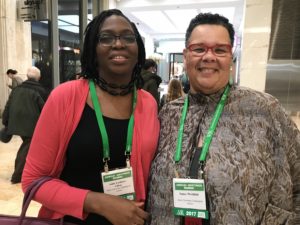Podcast: Play in new window | Download
Subscribe: RSS
 Womanist pedagogies is a way of teaching that connects stories and bodies and lived experience in the classroom. In part one of this podcast, I talk with Dr. Nancy Lynne Westfield and Dr. Annie Lockhart-Gilroy of Drew University Theology School about the origins of womanist pedagogies—the forebearers and the definition—and the practices in the classroom. Scholars in multiple academic disciplines adopt the term “womanist” from Alice Walker’s definition in In Search of Our Mothers’ Gardens. The focus of the discussion here is in religious education and theological studies. The discussion centers around the “wisdom-speak of the wisdom-kin,” the necessity of kitchen table conversations and the spaces of the ordinary, and the audacity of naming oneself.
Womanist pedagogies is a way of teaching that connects stories and bodies and lived experience in the classroom. In part one of this podcast, I talk with Dr. Nancy Lynne Westfield and Dr. Annie Lockhart-Gilroy of Drew University Theology School about the origins of womanist pedagogies—the forebearers and the definition—and the practices in the classroom. Scholars in multiple academic disciplines adopt the term “womanist” from Alice Walker’s definition in In Search of Our Mothers’ Gardens. The focus of the discussion here is in religious education and theological studies. The discussion centers around the “wisdom-speak of the wisdom-kin,” the necessity of kitchen table conversations and the spaces of the ordinary, and the audacity of naming oneself.
Dr. Annie Lockhart-Gilroy (left) is Assistant Professor of Christian Education and a Louisville Post-Doctoral Fellow at Drew Theology School. She teaches classes in Christian Education and Practical Theology. Her forthcoming book is entitled, Transforming Cities: Nurturing the Sanctified Imagination of Urban Youth.
Dr. Nancy Lynne Westfield (right) is Professor of Religious Education and director of the Public Theology Initiative at Drew University Theology School in Madison, N.J. She is an ordained deacon in the United Methodist Church, a frequent contributor to HuffPost, and a blogger for the Wabash Center for Teaching and Learning in Theology and Religion. She speaks first on the podcast.
The theme music for part 1 is written by Aviva and the Flying Penguins and performed by Aviva and Lance Erik Haugan. You can find more of Lance’s music at https://soundcloud.com/lance-haugan. Additional interstices music is from “Prayer for Syria” by Paul Myhre, associate director of the Wabash Center for Teaching Theology and Religious Studies. His music is available at https://www.reverbnation.com/paulomyhre/
